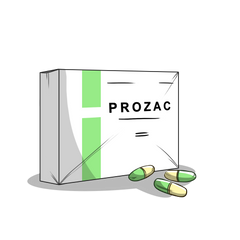
Much like humans, dogs can experience a wide range of feelings including depression, anxiety and stress. Similarly, they may not know how to handle these emotions, which can result in some negative animal behaviors. Because they cannot tell us about the emotions they are having, we can often discover the stress or dog anxiety through those behaviors.
When your dog is misbehaving, spending a lot of time barking, chewing, pacing or displaying other anxious signs, it's a good idea to take a deeper look into what may be going on. If dog owners decide to go the medical route, the veterinarian may prescribe tricyclic antidepressants or other medications. Dog prozac is one of the most common canine anxiety medication, but it's important to work with your vet to find the right option for your dog. With a little patience and trial and error, you can help your furry friend find relief from anxiousness.
What Is Prozac For Dogs?
Prozac is a medication aimed at helping to provide dogs some relief from anxiety as well as depression. Humans are also known to use medications like these for similar purposes. By enhancing the activity of a neurotransmitter called serotonin, found in the brain, this medication can be useful in keeping dogs calmer and happier overall.
Knowing how Prozac works is important for ensuring that your dog receives the best results, whether you choose to use brand name or generic Prozac. Options like fluoxetine for dogs, trazodone and lovane are all options your vet may prescribe. There are many who prefer a prozac generic product, as they can prove to be less expensive.
Many pet owners are left wondering what they can give their dog for anxiety, and in truth there are actually many options. Prozac for anxiety can be quite useful, but it's important to follow instructions for the medication very well. Understanding the Prozac or Lovan side effects, the Trazodone dosage for dogs and how to avoid a Prozac overdose is key to keeping your dog healthy and happy.
Whether you're using Prozac, fluoxetine for dogs, or another variety of the medication, it's important to understand as much as you can about the medication.
Prozac For Dog Anxiety
Dogs have a wide variety of different personalities, and the experiences they've had in their lives can effect them in much the same way that our experiences effect us. Because of this, some dogs may be more prone to anxiety than others, which can present itself regularly or just during certain times like when they are left alone, or when things like thunder or fireworks are present.
When dogs are feeling anxious, they may begin to behave in unwanted ways. They may have accidents, bark frequently, or damage household items. Before you get mad at this behavior, take a moment to consider why it might be happening.
For things like separation anxiety or agitation that is particularly intense, your vet might choose to offer a prescription for something like Prozac. Basically, this medication inhibits the absorption and the processing of serotonin, limiting the anxious effects that it can cause in your dog.
Prozac For Dogs Uses And Doses
The instances when Prozac may be used for dogs can be different than what you'd find in humans. Furthermore, the dosages dogs require are also going to be very different. The following will help to guide you through when your dog might need Prozac, and about how much may be prescribed.
Uses
Some of the common reasons your dog may be prescribed Prozac include:

- Separation anxiety
- Phobia of people, thunderstorms or other specific things
- Compulsive disorders
- Aggression
- General anxiety
- Excessive urine marking
If your dog has any of these behaviors, make sure to discuss possible solutions with your vet. Prozac, or similar medications, such as Trazodone, can put a dog to sleep, so make sure to watch out for added drowsiness as well.
Prozac Dosages
The dosage that your dog may need is going to be different from what you might be prescribed, so it's important to follow your vet's instructions while administering it to your pet. They will be able to guide you to the correct amount.
It's worth keeping in mind that Prozac is addictive, so your vet may want you to slowly wean your dog off of the medication when they are finished with it. Prozac for anxiety can make dogs feel sleepy, so it's important to make sure dosages are handled well, and that you ask your vet when the best time for your dog to take Prozac is, as well as what to do when stopping Prozac.
Dog Prozac Vs. Human Prozac
Human Prozac should not be given to dogs under any circumstances. When you do this, you create a much higher risk of overdose, as well as create the possibility that your dog is receiving medication they do not need. If you think your dog may need Prozac, make sure to get them to a vet.
Prozac Benefits For Dogs
In recent years, there's been an increase in the number of pet prescriptions for anxiety disorders and other behavioral issues. Prozac is one of the most commonly prescribed meds for dogs. It's one of many controlled substances that's meant to be used alongside a behavior modification program. The medication can help to calm nervous dogs who are experiencing anxiousness and reduce the effects of compulsive behaviors, such as excessive licking and urine marking.
Prozac can also be helpful for dogs who tend to urine mark inappropriately, like in the home. However, it's important to note that this medication is only meant to be used as part of a comprehensive treatment plan that includes behavior modification training. Otherwise, the medication will not be effective.
Does My Dog Need Prozac?
In some cases, dogs who experience the issues listed above may be able to work through their issues in other ways, such as through training or other medications. If your dog experiences any of those symptoms, then talk to your vet about it and they will help to provide effective options.
Prozac Side Effects
Like many other medications out there, Prozac does come with a list of possible side effects. Some of these may be more dangerous, while others are more mild. Because of this, it's a good idea to have an understanding of the possible side effects of Prozac that your dog might experience.
Some of the side effects in dogs include the following:
- Loss of appetite
- Seizures
- Diarrhea
- Insomnia
- Vomiting
- Aggression
- Itching
- Liver damage
If you notice that your dog is having an intensely bad reaction, or even more standard side effects in high amounts, like vomiting or diarrhea, it's best to contact your vet.
Avoiding The Side Effects Of Prozac
A useful way to determine whether or not your dog might have some unpleasant side effects is to note any conditions they may already have. This might include being finicky, experiencing liver issues, or having a stomach that is easily upset.
If your dog already experiences issues like these, then giving them Prozac can potentially exacerbate the conditions and create nasty side effects. If your pet has diabetes mellitus or seizure disorders, they may be especially susceptible to side effects from Prozac. Canines with liver or kidney disease may not do very well on Prozac.
If your dog doesn't have any of these kinds of conditions, then they can still be subject to side effects. The lack of those conditions just means that it's less likely they will have serious issues with the medication. As with any new medication, make sure to keep an eye on your dog to make sure they are handling it well.
Types Of Anti-Anxiety Medications For Dogs
Because medications like Prozac can come in generic as well as brand name forms, it's important to know what types are out there. Prozac is the most well known, but it is just a brand name for a drug called Fluoxetine. You can also find another brand name of this medication known as Reconcile for dogs.
Natural Anti-Anxiety Options
It's wise not to focus on using medication alone for the sake of managing your dog's anxiousness. Often, medications work well as bandages, but do not heal the deeper issue. Consequently, the following options can help to relieve anxiety in your dog for the long term.
Exercise
Anxiety often comes with a lot of excess energy. When that energy isn't used in a productive way, it can result in a greater amount of anxiety and the destructive behaviors that come with it. Making sure that your dog is getting daily walks and playtime can help to decrease their anxiety levels.
Training
Some types of anxiety can be adjusted through the use of training. This is particularly true when your dog is afraid of something specific, like separation, travel or thunderstorms. Find ways to connect these events to positive experiences in your dog, and in time they'll be less afraid of it.
Diet
While diet isn't often the only change your dog may need, it certainly doesn't help to make sure they are on a healthy diet that works well to suit their needs. In some cases, you can even opt for a prescription food that includes calming ingredients!
Prozac FAQ
Some pet owners out there may have questions about Prozac before they start providing it to their pet, it's only natural! The following are some of the common questions that pet owners may have about the medication. Read up and learn what to expect for your dog.
How Long Does It Take For Prozac To Work?
Prozac is a medication that can build up effects over time, so it may be a few weeks before you start to notice big changes in the behavior of your dog. It's also a great time to start working on new routines and habits that can help to keep their anxiety levels down.
How Will My Dog Respond?
Each dog is unique, so it can be difficult to tell exactly how your dog will react to the medication. Because of that, it's important to note any changes you see, as well as side effects. If your dog doesn't seem to be responding well, don't hesitate to contact your vet.
Are There Prozac Interactions?
While you're talking to your vet, make sure that they are aware of any other medications your pet might be on. Make sure to include everything, even flea medications and supplements. Drug interactions can potentially occur between Prozac and other medications, so it's important that the vet is aware of everything that your dog is taking. Additionally, clinical signs of behavioral disorders may be different in dogs who are also taking other drugs.
Many canine owners are hesitant to give their pets drugs, but sometimes it is necessary in order to improve their quality of life. Fluoxetine a very safe drug, and animal behaviorists often recommend it for dogs with behavioral disorders.
The only time you need to be careful is if your dog is taking another medication that affects serotonin levels, as this can cause drug interactions. If you notice your dog exhibiting clinical signs of serotonin syndrome, such as agitation, increased heart rate, or muscle twitching, contact your veterinarian immediately. However, as long as you are aware of the potential risks, Prozac can be a very effective way to improve your dog's behavior.
Is There A Limit On How Long My Dog Will Need The Medication?
This can really depend on your dog's situation. In some cases, they may only need the Prozac during a stressful event. In other instances, your dog may need it daily until the training and new habits have set in well enough to resolve the issue. It's really going to depend on your dog's situation.
Can I Use Training For Anxiety?
Depending on the kind of anxiety your dog is experiencing, it is possible to ease their fears using training. Things like positive reinforcement, relaxing routines and other habits can help dogs to avoid connecting certain events with fear.
CBD For Dogs
Another fantastic option that has recently made its way to the supplement market is CBD. While the science on this product is limited due to recently-changing laws, there are a wide number of customer experiences that show it can be a useful and safe product in a number of ways.
From relieving pain to managing anxiety and even stopping seizures, CBD has a lot to offer to dogs and their owners alike. Furthermore, it's a completely natural product which avoids the vast majority of nasty side effects that can come with other types of prescription medications. This makes it much more friendly to users.
CBD For Anxiety
CBD is an option that is fantastic for dealing with things like anxiety due to CBD's ability to enhance the brain's receptors for serotonin - a neurotransmitter that is responsible for helping regulate mood and social behavior. It offers a calming result, which is fantastic for dogs that tend to be very wound up. Just a little bit goes a long way, and for most dogs the worst side effect discovered so far is that higher doses can result in a little bit of sleepiness.
This is huge when compared to the vomiting, liver damage, and more that can come with other medications. Its also makes CBD worth trying out whether you have a dog that is prone to anxiety, or perfectly healthy. Overall, it's a fantastic supplement.
Top CBD Products
Making sure that you purchase high-quality CBD is very important. The hemp plants used to produce CBD can be highly absorbent, so it's best to avoid options that aren't organic. That way, you won't need to worry about any chemicals having made their way into the finished product.
CBD Oil
CBD oil is great for pets that might be a bit more finicky. It's also an option that works very well for cats and horses as well as your canine companion, CBD oil for dogs can easily be mixed into food, or simply placed on your pet's tongue, and they'll be able to get the benefits without too much of a hassle.
CBD Treats
When you want something simple, CBD dog treats are an easy option. Depending on the size of your pet, you can simply give them a whole treat, or a chunk of one and they'll be perfectly happy. Your dog will never know the difference between a normal treat and these delicious CBD ones!
Prozac For Dogs: The Bottom Line
It can be a rough time when our pets aren't feeling well. However, it can be helpful to know that there are a number of ways in which you can help your dog with their anxiety. Things like training, natural products and medications provided by your vet can prove to be immensely helpful.
If you're worried about your dog potentially showing signs of anxiety, then make sure to discuss the matter with your vet. They will be able to talk to you about all the potential options and help you to find the best solution to get your dog feeling better.
Sources
The use of fluoxetine by veterinarians in dogs and cats
Long-term consequences of chronic fluoxetine
Classics in Chemical Neuroscience
The use of fluoxetine by veterinarians in dogs and cats
Fluoxetine in Dogs and Cats
Fluoxetine (Reconcile, Prozac)
Approved by:
Dr. Ivana Vukasinovic
Doctor of Veterinary Medicine, University of Belgrade
 Ivana Vukasinovic grew up in Serbia and attended the University of Belgrade where she received a degree in Veterinary medicine in 2012 and later completed surgical residency working mostly with livestock. Her first year of practice was split between busy small animal practice and emergency clinic, and after two more years of treating many different species of animals, she opened her own veterinary pharmacy where an interest in canine and feline nutrition emerged with an accent on fighting animal obesity. In her free time, she acts as a foster parent for stray animals before their adoption, likes to read SF books and making salted caramel cookies.
Ivana Vukasinovic grew up in Serbia and attended the University of Belgrade where she received a degree in Veterinary medicine in 2012 and later completed surgical residency working mostly with livestock. Her first year of practice was split between busy small animal practice and emergency clinic, and after two more years of treating many different species of animals, she opened her own veterinary pharmacy where an interest in canine and feline nutrition emerged with an accent on fighting animal obesity. In her free time, she acts as a foster parent for stray animals before their adoption, likes to read SF books and making salted caramel cookies.
Thanks for stopping by!
P.S. We Love You!
Sincerely,
The Innovet Team
Please do not ask for emergency or specific medical questions about your pets in the comments. Innovet Pet Products is unable to provide you with specific medical advice or counseling. A detailed physical exam, patient history, and an established veterinarian are required to provide specific medical advice. If you are worried that your pet requires emergency attention or if you have specific medical questions related to your pet’s current or chronic health conditions, please contact or visit your local/preferred veterinarian, an animal-specific poison control hotline, or your local emergency veterinary care center.
Please share your experiences and stories, your opinions and feedback about this blog, or what you've learned that you'd like to share with others.


















